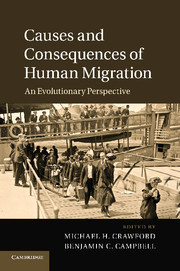Book contents
- Frontmatter
- Contents
- Contributors
- Preface
- 1 Perspectives on human migration: introduction
- Section 1 Theory
- Section 2 Geography and migration
- 8 Population structure and migration in Africa: correlations between archaeological, linguistic, and genetic data
- 9 Human migrations in North Africa
- 10 Identity, voice, community: new African immigrants to Kansas
- 11 The African colonial migration into Mexico: history and biological consequences
- 12 Demic expansion or cultural diffusion: migration and Basque origins
- 13 Consequences of migration among the Roma: immunoglobulin markers as a tool in investigating population relationships
- 14 Migration, assimilation, and admixture: genes of a Scot?
- 15 Mennonite migrations: genetic and demographic consequences
- 16 Human migratory history: through the looking-glass of genetic geography of Mycobacterium tuberculosis
- 17 Peopling the Tibetan plateau: migrants, genes, and genetic adaptations
- 18 Migration, globalization, instability, and Chinese in Peru
- 19 The great blue highway: human migration in the Pacific
- 20 Migration of pre-Hispanic and contemporary human Mexican populations
- 21 A review of the Tupi expansion in the Amazon
- 22 Molecular consequences of migration and urbanization in Peruvian Amazonia
- 23 Migration in Afro-Brazilian rural communities: crossing historical, demographic, and genetic data
- 24 Indentured migration, gene flow, and the formation of the Indo-Costa Rican population
- 25 Causes and consequences of migration to the Caribbean Islands and Central America: an evolutionary success story
- Section 3 Overview
- Index
- References
10 - Identity, voice, community: new African immigrants to Kansas
Published online by Cambridge University Press: 05 December 2012
- Frontmatter
- Contents
- Contributors
- Preface
- 1 Perspectives on human migration: introduction
- Section 1 Theory
- Section 2 Geography and migration
- 8 Population structure and migration in Africa: correlations between archaeological, linguistic, and genetic data
- 9 Human migrations in North Africa
- 10 Identity, voice, community: new African immigrants to Kansas
- 11 The African colonial migration into Mexico: history and biological consequences
- 12 Demic expansion or cultural diffusion: migration and Basque origins
- 13 Consequences of migration among the Roma: immunoglobulin markers as a tool in investigating population relationships
- 14 Migration, assimilation, and admixture: genes of a Scot?
- 15 Mennonite migrations: genetic and demographic consequences
- 16 Human migratory history: through the looking-glass of genetic geography of Mycobacterium tuberculosis
- 17 Peopling the Tibetan plateau: migrants, genes, and genetic adaptations
- 18 Migration, globalization, instability, and Chinese in Peru
- 19 The great blue highway: human migration in the Pacific
- 20 Migration of pre-Hispanic and contemporary human Mexican populations
- 21 A review of the Tupi expansion in the Amazon
- 22 Molecular consequences of migration and urbanization in Peruvian Amazonia
- 23 Migration in Afro-Brazilian rural communities: crossing historical, demographic, and genetic data
- 24 Indentured migration, gene flow, and the formation of the Indo-Costa Rican population
- 25 Causes and consequences of migration to the Caribbean Islands and Central America: an evolutionary success story
- Section 3 Overview
- Index
- References
Summary
Introduction
The story of recent African migration to the American heartland is a very small vignette of migration throughout human history, of postcolonial global labor and opportunity migration; and, of the historic migrations that in earlier centuries and decades populated the countrysides and cities of the expanding American frontier. This chapter reports on a project conducted by the African Studies Center at the University of Kansas from 2005 to 2007 about recent African migration into the urban centers of northeast and southcentral Kansas – Kansas City, Lawrence, Topeka, Emporia, Wichita. The project was conceived in a fall 2004 seminar organized by Center assistant, and later Associate Director, Khalid Elhassan, in which representatives of the region’s African immigrant communities came to share their stories of migration, their visions for their communities, and how they might work with the Center in topics of mutual interest. Their strong endorsement led the Center to join the Kansas Humanities Council’s “We the People” initiative, an extension of the national program by the same name. Core features of the project included interviews of community members about their immigrant experience; several community meetings with speakers from the communities for discussion, and interpretations of these experiences by project humanists Omofolabo Ajayi and David Katzman of the University of Kansas faculty; and the preparation of a videofilm. The project’s public education thrust sought to explain to Kansans and Americans who the new immigrants are, the circumstances of their leaving home, why they had come here, and what distinctive human perspectives and practices they contribute to American society. The project thus combined solid scholarly research (Lohrentz, 2004) and analysis with public awareness raising.
Perspectives on migration, research, and public programming
Migration is an old American phenomenon. Most Americans have a history of immigration in their background. Although this project focused on a regional representation of over a million African-born immigrants and their offspring who live in the United States, this group fits within a larger picture (Apraku, 1991; Djamba, 1999; Takougang, 2003). Immigrants and immigration policy have captured much attention and aroused political debate in recent years, in the United States as well as in other countries. While most Americans think of Mexican or Hispanic immigrants when they think “immigrants,” in fact there are many other groups who have come to the United States in the past decade or two.
- Type
- Chapter
- Information
- Causes and Consequences of Human MigrationAn Evolutionary Perspective, pp. 186 - 200Publisher: Cambridge University PressPrint publication year: 2012
References
- 1
- Cited by

